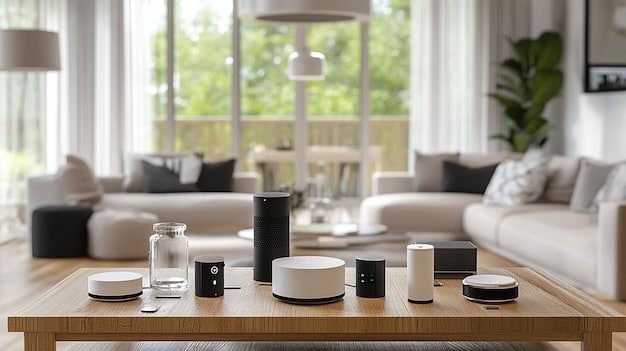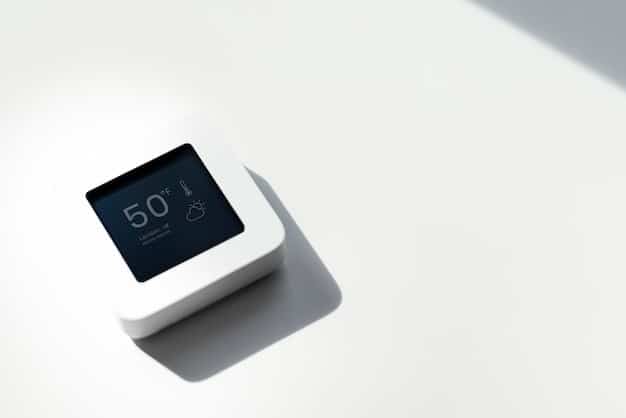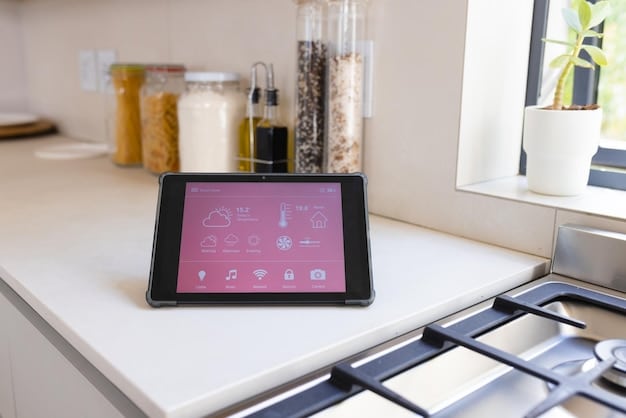Are 2025 Smart Home Gadgets Worth the Hype? An In-Depth Review

The verdict on whether the new 2025 smart home gadgets are worth the hype depends on individual needs, technological advancements, and cost-benefit analysis, as this review dives into the potential game-changers and everyday improvements these gadgets could bring to your connected home.
Are the promises of seamless integration, enhanced security, and energy efficiency in the new 2025 smart home gadgets worth the hype or just another fleeting trend? Let’s dive into an in-depth review.
The Evolution of Smart Homes: A 2025 Perspective
Smart homes have come a long way from simple remote-controlled lights. In 2025, we’re seeing a convergence of artificial intelligence, advanced sensors, and seamless connectivity that promises to transform our living spaces. But is this evolution delivering real value, or is it just adding complexity?
Enhanced Integration and AI-Powered Assistants
One of the key advancements is the enhanced integration between different smart home devices. AI-powered assistants are now capable of learning user preferences and automating tasks more intelligently.
The Rise of Personalized Automation
Personalized automation is becoming increasingly prevalent. Smart thermostats learn your heating and cooling preferences, while smart lighting systems adjust based on your mood and time of day.
- Improved energy efficiency through predictive algorithms.
- Enhanced security with AI-driven surveillance systems.
- Seamless control via voice and gesture recognition.
- Personalized experiences tailored to individual needs.
The evolution of smart homes in 2025 is marked by more sophisticated AI, better integration, and a focus on personalization, all aimed at making our lives easier and more efficient.

Smart Security Systems: Keeping Your Home Safe in 2025
Security is a primary concern for homeowners, and smart security systems in 2025 are offering more advanced features than ever before. From AI-powered surveillance to biometric access control, these systems are designed to provide comprehensive protection.
AI-Driven Surveillance and Threat Detection
AI-driven surveillance systems can now distinguish between normal activity and potential threats. They can identify suspicious behavior, alert authorities, and provide real-time video feeds.
Biometric Access Control and Secure Entry Systems
Biometric access control, such as fingerprint and facial recognition, is becoming more common, offering a higher level of security compared to traditional locks and keys.
- Real-time alerts and notifications on your smartphone.
- Remote control of door locks and security cameras.
- Integration with local law enforcement for faster response times.
- Advanced encryption to protect against hacking and cyber threats.
Smart security systems in 2025 offer a significant upgrade in home protection, leveraging AI and biometric technology to create a safer living environment.
Smart Lighting and Energy Management: Brighter and Greener Homes
Smart lighting and energy management systems are not only enhancing the ambiance of our homes but also helping us reduce our carbon footprint. These systems offer a range of features designed to optimize energy usage and create a more sustainable living environment.
Adaptive Lighting and Personalized Ambiance
Adaptive lighting systems can adjust the brightness and color temperature of lights based on the time of day, weather conditions, and user preferences.
Smart Energy Monitoring and Control
Smart energy monitoring systems provide real-time insights into energy consumption, allowing homeowners to identify areas where they can save energy.
Smart lighting and energy management systems are making homes brighter, greener, and more energy-efficient, contributing to a more sustainable future.

Smart Kitchen Appliances: Cooking and Dining in the Future
The kitchen is often considered the heart of the home, and smart kitchen appliances in 2025 are transforming the way we cook and dine. From smart refrigerators to AI-powered ovens, these appliances offer a range of features designed to make meal preparation easier and more enjoyable.
AI-Powered Cooking and Recipe Recommendations
AI-powered ovens can automatically adjust cooking times and temperatures based on the type of food being prepared, while smart refrigerators can recommend recipes based on available ingredients.
Automated Grocery Ordering and Inventory Management
Smart refrigerators can also track inventory levels and automatically order groceries when supplies are running low, ensuring you never run out of essential items.
- Hands-free control with voice commands.
- Remote monitoring and control via smartphone app.
- Personalized dietary recommendations and meal planning.
- Integration with smart home ecosystems for seamless operation.
Smart kitchen appliances in 2025 are revolutionizing the way we cook and dine, making meal preparation easier, more efficient, and more enjoyable.
Smart Entertainment Systems: Immersive and Personalized Experiences
Entertainment is an integral part of our lives, and smart entertainment systems in 2025 are delivering more immersive and personalized experiences than ever before. From smart TVs to augmented reality (AR) gaming, these systems offer a range of features designed to enhance our leisure time.
Smart TVs with Enhanced Streaming and AI-Powered Recommendations
Smart TVs can now stream content in 8K resolution and offer AI-powered recommendations based on viewing history and preferences.
Augmented Reality Gaming and Immersive Entertainment
Augmented reality gaming is becoming increasingly popular, blending digital content with the real world to create immersive and interactive experiences.
- Voice-controlled entertainment systems for hands-free operation.
- Personalized playlists and content recommendations.
- Integration with smart home ecosystems for seamless control.
- Immersive audio and visual experiences with advanced sound systems and displays.
Smart entertainment systems in 2025 are transforming the way we consume content, providing more immersive, personalized, and engaging experiences.
The Dark Side of Smart Homes: Potential Privacy and Security Concerns
While smart home gadgets offer numerous benefits, they also raise potential privacy and security concerns. It’s important to be aware of these risks and take steps to protect your personal information and data.
Data Collection and Privacy Breaches
Smart home devices collect vast amounts of data about our behavior, preferences, and habits. This data can be vulnerable to privacy breaches if not properly secured.
Hacking and Cyber Threats
Smart home devices are also susceptible to hacking and cyber threats, which can compromise the security of your home and personal information.
- Use strong passwords and enable two-factor authentication.
- Regularly update your smart home devices with the latest security patches.
- Be mindful of the data you share with smart home companies.
- Use a VPN to encrypt your internet traffic and protect your privacy.
Addressing privacy and security concerns is crucial to ensuring that smart homes are safe and beneficial for everyone.
Future Trends in Smart Home Technology: What to Expect Beyond 2025
Looking beyond 2025, we can expect even more exciting developments in smart home technology. From holographic displays to brain-computer interfaces, the future of smart homes is full of possibilities.
Holographic Displays and Interactive Interfaces
Holographic displays could replace traditional screens, projecting images and information directly into our living spaces.
Brain-Computer Interfaces and Mind Control
Brain-computer interfaces could allow us to control smart home devices with our thoughts, offering a more intuitive and seamless user experience.
- Integration of blockchain technology for secure data management.
- Development of sustainable and eco-friendly smart home solutions.
- Expansion of smart home technology to urban planning and infrastructure.
- More personalized and adaptive smart home experiences based on individual needs.
The future of smart home technology is bright, with innovations that promise to transform the way we live, work, and interact with our environment.
| Key Point | Brief Description |
|---|---|
| 💡 Enhanced Integration | Seamless connection of devices via AI for automated tasks. |
| 🔒 Smart Security | AI-driven surveillance and biometric access for comprehensive protection. |
| 🍳 Smart Kitchen | AI-powered cooking, auto grocery ordering, and recipe recommendations. |
| ⚡ Energy Management | Adaptive lighting and real-time energy monitoring for efficient usage. |
FAQ
▼
Many 2025 gadgets offer simplified setup processes with intuitive apps and voice-guided instructions. However, full integration might require professional assistance.
▼
Security varies by device, but many now include advanced encryption and AI-driven threat detection. Always update firmware and use strong passwords to enhance security.
▼
Yes, most 2025 smart home gadgets can be controlled remotely via smartphone apps or voice assistants, providing convenience and peace of mind while you’re away.
▼
Some gadgets have local control options or battery backups for essential functions. Evaluate each device’s offline capabilities based on your needs and typical usage.
▼
The value depends on your needs and priorities. If you seek enhanced security, convenience, and energy savings, these gadgets could be a worthwhile addition to your home.
Conclusion
In conclusion, the 2025 smart home gadgets present a compelling vision of the future, offering improved security, convenience, and energy efficiency. However, potential privacy concerns and cost considerations should be carefully evaluated before investing. Ultimately, the decision of whether these gadgets are worth the hype depends on individual needs and priorities.


![Is the updated [product] truly better? A deep dive into enhancements Is the updated [product] truly better? A deep dive into enhancements - Cover Image](https://youforyous.com/wp-content/uploads/2025/07/youforyous.com_4_1753831175_a20b5125_cover-360x180.jpg)


